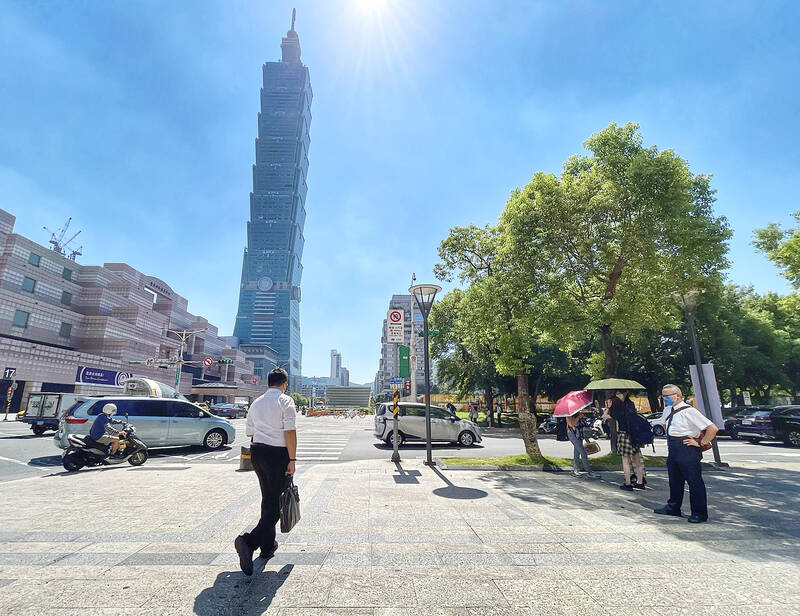S&P Global Ratings yesterday affirmed its “AA+” long-term and “A-1+” short-term credit ratings for Taiwan.
“The stable outlook reflects our expectation that over the next 24 months, risks to the ratings remain fairly balanced,” S&P said in a statement on its Web site.
Structural demand for Taiwanese semiconductor exports is likely to offset headwinds associated with long-standing geopolitical tensions, the ratings agency said.

Photo: CNA
The ratings are anchored on Taiwan’s robust external position and strong economic support, although an ongoing semiconductor downturn would curb Taiwan’s growth in the short term, it said.
Softening global demand for technology products has weighed on key export sectors in Taiwan, with its semiconductor sector particularly exposed to the slowdown, it said.
Weakening global demand would also hit non-tech sectors, particularly suppliers of commodities and consumer products, the agency said.
“We expect Taiwan’s economic growth to slow this year,” S&P said.
However, Taiwan’s electronics manufacturing sector remains dynamic, highly competitive and well-placed to benefit from long-term developments in technology-intensive integrated circuit chips, the agency said.
Although workers around the world have returned to their offices, reducing the need for remote-working equipment, demand for chips would likely remain robust due to a boom in artificial intelligence, 5G network deployment, big data processing and analytics, and electric vehicles, S&P said.
Taiwan’s growth prospects would be brighter than its peers at a similar income level, it said.
Effective policymaking has contributed to the government’s fiscal health, evidenced by robust domestic liquidity and low debt-servicing costs, it said.
“We expect Taiwan to maintain healthy fiscal metrics over the next three to five years,” S&P said.
However, cross-strait tensions continue to constrain Taiwan’s ratings, as a sharp deterioration in risk sentiment could hurt its export-reliant economy and fiscal position, it said.
The ratings agency said cross-strait relations would not deteriorate toward a major military conflict, adding that close economic and trade links between Taiwan and China support this assessment.

UNCERTAINTY: Innolux activated a stringent supply chain management mechanism, as it did during the COVID-19 pandemic, to ensure optimal inventory levels for customers Flat-panel display makers AUO Corp (友達) and Innolux Corp (群創) yesterday said that about 12 to 20 percent of their display business is at risk of potential US tariffs and that they would relocate production or shipment destinations to mitigate the levies’ effects. US tariffs would have a direct impact of US$200 million on AUO’s revenue, company chairman Paul Peng (彭雙浪) told reporters on the sidelines of the Touch Taiwan trade show in Taipei yesterday. That would make up about 12 percent of the company’s overall revenue. To cope with the tariff uncertainty, AUO plans to allocate its production to manufacturing facilities in

TAKING STOCK: A Taiwanese cookware firm in Vietnam urged customers to assess inventory or place orders early so shipments can reach the US while tariffs are paused Taiwanese businesses in Vietnam are exploring alternatives after the White House imposed a 46 percent import duty on Vietnamese goods, following US President Donald Trump’s announcement of “reciprocal” tariffs on the US’ trading partners. Lo Shih-liang (羅世良), chairman of Brico Industry Co (裕茂工業), a Taiwanese company that manufactures cast iron cookware and stove components in Vietnam, said that more than 40 percent of his business was tied to the US market, describing the constant US policy shifts as an emotional roller coaster. “I work during the day and stay up all night watching the news. I’ve been following US news until 3am

Taiwan will prioritize the development of silicon photonics by taking advantage of its strength in the semiconductor industry to build another shield to protect the local economy, National Development Council (NDC) Minister Paul Liu (劉鏡清) said yesterday. Speaking at a meeting of the legislature’s Economics Committee, Liu said Taiwan already has the artificial intelligence (AI) industry as a shield, after the semiconductor industry, to safeguard the country, and is looking at new unique fields to build more economic shields. While Taiwan will further strengthen its existing shields, over the longer term, the country is determined to focus on such potential segments as

COLLABORATION: Given Taiwan’s key position in global supply chains, the US firm is discussing strategies with local partners and clients to deal with global uncertainties Advanced Micro Devices Inc (AMD) yesterday said it is meeting with local ecosystem partners, including Taiwan Semiconductor Manufacturing Co (TSMC, 台積電), to discuss strategies, including long-term manufacturing, to navigate uncertainties such as US tariffs, as Taiwan occupies an important position in global supply chains. AMD chief executive officer Lisa Su (蘇姿丰) told reporters that Taiwan is an important part of the chip designer’s ecosystem and she is discussing with partners and customers in Taiwan to forge strong collaborations on different areas during this critical period. AMD has just become the first artificial-intelligence (AI) server chip customer of TSMC to utilize its advanced